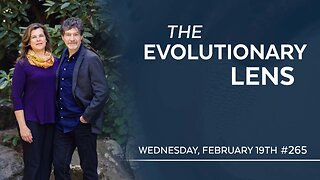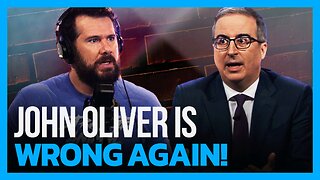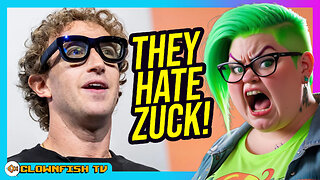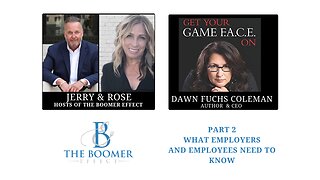Premium Only Content

The Gen Z Workforce Paradox: Stress, Burnout, and Unfulfilled Potential
Generation Z, born roughly between 1997 and 2012, is rapidly becoming a significant force in the workforce. However, recent statistics paint a concerning picture: 98% of Gen Z workers report experiencing burnout, with nearly half feeling drained and a significant portion grappling with unmanageable stress. Simultaneously, employers are voicing frustrations, with six in ten reporting unsatisfactory performance and contemplating avoiding Gen Z hires altogether.
This paradox raises a critical question: How can a generation both struggle profoundly and disappoint at work, despite being touted as tech-savvy, innovative, and socially conscious?
A Generation Under Pressure
The Roots of Burnout
1. Digital Overload
Gen Z grew up immersed in technology, a double-edged sword. While it has provided unparalleled access to information and connectivity, it has also blurred the boundaries between work and personal life. Constant notifications, digital monitoring, and the “always-on” culture exacerbate stress.
2. Economic Instability
Many Gen Z workers entered the workforce during or after the COVID-19 pandemic, facing unprecedented uncertainty. Stagnant wages, skyrocketing housing costs, and inflation mean they are working harder but struggling to achieve financial independence.
3. Mental Health Crisis
Gen Z has been vocal about prioritizing mental health, but this transparency reveals an alarming trend: heightened anxiety, depression, and stress levels. The pressure to “do it all” in a competitive world often leads to paralysis rather than productivity.
Workplace Challenges
• Remote Work Adjustments
While remote and hybrid work models are more prevalent, they can leave Gen Z workers feeling isolated and disconnected, compounding stress and diminishing team collaboration.
• Unrealistic Expectations
Many Gen Z workers express a desire for meaningful work, but the reality of entry-level jobs often clashes with their ideals, leading to dissatisfaction and disengagement.
Employers’ Frustrations with Gen Z
On the other side of the equation, employers are reporting that many Gen Z hires lack motivation, communication skills, and professionalism. What’s driving these perceptions?
1. Misaligned Expectations
Gen Z workers often seek rapid career progression, work-life balance, and purpose-driven roles. When these expectations aren’t met, their engagement suffers, creating a perception of entitlement or laziness.
2. Soft Skills Gap
Growing up in a digital world has sometimes come at the expense of face-to-face communication and interpersonal skills, making it challenging for Gen Z workers to thrive in collaborative environments.
3. Cultural Disconnect
Traditional workplace norms often clash with Gen Z values, such as prioritizing mental health and questioning authority. Without mutual understanding, tensions arise.
What This Means for the Future of Work
The challenges Gen Z faces—and presents—highlight systemic issues within modern workplaces. Addressing these concerns requires a shift in perspective from both employers and employees.
For Employers
• Revamp Onboarding and Training
Equip Gen Z hires with the soft skills and technical competencies they may lack through robust mentorship and training programs.
• Cultivate Empathy and Understanding
Recognize the unique challenges Gen Z faces. Prioritize mental health initiatives, flexible work arrangements, and clear career development pathways.
• Foster Purpose and Engagement
Gen Z thrives when they feel their work matters. Align roles with company missions and offer opportunities for meaningful contributions.
For Gen Z Workers
• Adapt and Upskill
Recognize the importance of soft skills like communication, teamwork, and time management. These are as critical as technical expertise.
• Manage Expectations
Success takes time. Focus on growth, patience, and resilience rather than immediate gratification.
• Balance Passion with Practicality
While it’s vital to seek purpose in work, not every role will align with personal passions. Find ways to integrate meaning into your life outside of the workplace.
A Collaborative Future
The generational gap between employers and Gen Z workers doesn’t have to be a chasm. Instead, it can serve as an opportunity to redefine workplace culture, prioritize mental health, and innovate in ways that benefit everyone.
If employers and Gen Z can meet each other halfway, this generation has the potential to bring fresh perspectives, technological acumen, and a commitment to social responsibility that could reshape industries for the better. The challenge lies in turning frustration into collaboration and burnout into balance.
-
 2:04:38
2:04:38
FragmentsOfTruth
2 days agoThe Ultimate Red Pill Compilation: Secrets They Don’t Want You to Know
4631 -
 LIVE
LIVE
Darkhorse Podcast
1 hour agoThe 265th Evolutionary Lens with Bret Weinstein and Heather Heying
787 watching -
 23:18
23:18
Crowder Bits
7 hours agoDebunked: John Oliver's Outrageous Lies About Trump 2.0
79.3K37 -
 1:59:18
1:59:18
Russell Brand
3 hours agoThe Battle for Truth: Gregg Hurwitz on Myth, Power & Cultural Control – SF540
100K40 -
 2:00:46
2:00:46
Steven Crowder
6 hours agoFight! Major Lawsuit Announcement...
492K280 -
 19:50
19:50
Clownfish TV
16 hours agoFacebook FIRED 'Underperforming' Employees and They're P*SSED!
10.7K7 -
 8:34
8:34
Dr. Nick Zyrowski
27 days agoWhat Happens If You Take High Dose NAC ( N-Acetyl Cysteine) For 14 Days
13.9K12 -
 25:31
25:31
The Boomer Effect
4 hours agoPotential Employees and Employers: What You Need to Know For The Hire
7.63K1 -
 2:55:25
2:55:25
The Dana Show with Dana Loesch
3 hours agoTRUMP AND ELON MUSK DEFEND DOGE | The Dana Show LIVE On Rumble!
27.8K1 -
 59:31
59:31
Grant Stinchfield
3 hours ago $2.81 earnedThe Heist of Fort Knox That President Trump Thwarted
32.2K21